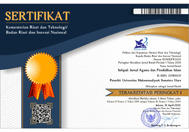Literasi Kurasi Digital Bagi Guru Pendidikan Agama Islam
Abstract
Keywords
Full Text:
PDFReferences
Achjari, Didi. (2000). “Pemanfaatan Internet Untuk Riset Dan Implikasi Terhadap Riset Akuntansi”, Jurnal Ekonomi dan Bisnis Indonesia, 15 (2).
Bakry, Anjas Alifah. (2016). “Kurasi Digital Untuk Pengarsipan Digital” Jurnal Ilmu Perspustakaan dan Informasi, 1 (1).
De Rossi, L. C. & Good, R. (2010). The 15 basic traits of a news / content curation system.
Deschaine, Mark E. dan Sue Ann Sharma. (2015). “The Five Cs of Digital Curation: Supporting Twenty-First –Century Teaching and Learning” InSight: A journal of Scholarly Teaching, 10 (2).
Digital Curation: Scope and Incentives, Chapter 1. Flintoff, Kim. et. al. (2014). “Digital Curation: Opportunities for Learning, Teaching, Research and Professional Develpment” Teaching and Learning Forum.
Gadot, Rivki. Ilya Levin. (2012). “Digital Curation As Learning Activity”, Proceedings of EDULEARN12 Conference, Barcelona, Spain. 2nd-4th July.
Kurniawan, Aris. et. al. (2018). “Digital Curation di UPT Perpustakaan Jenderal Soedirman” Jurnal Dokumentasi dan Informasi, 39 (1).
Makmur, Testiani. (2019). “Revolusi sumber-sumber informasi di internet Dan hubungannya dengan masyarakat informasi”, Al-Kuttab: Jurnal Kajian Perpustakaan, Informasi dan Kearsipan, 1 (1).
Mills, M.S Facilitating multimodal literacy instruction through digital curation. In J. Whittingham, S. Huffman, W. Rickman, & C Wiedmaier Hershey (Eds.). (2013). Technological tools for the literacy classroom, Hershery, PA: Idea Group Inc.
Musrifah. (2017). “Strategi Preservasu Digital di Perpustkaaan UIN Sunan Kalijaga Yogyakarta”, Khizanah Al-Hikmah, 5 (1).
Ovadia, Steven. (2013). “Internet Connection: Digital Conten Curation and Why It Matters to Librarians” Behavioral and Social Sciences Librarian, 32.
Sharma, Sue Ann dan Mark E. Deschaine. (2016). “Digital Curation: A Framework to Enhance Adolescent and Adult Literacy Initiatives” Jurnal of Adolescent and Adult Literacy, 60 (1).
Subandi. (2011). Deskripsi Kualitatif Sebagai Satu Metode dalam Penelitian Pertunjukan. Harmonia.
Ungerer, Leone M. (2016). “Digital Curation as a Core Competency in Current Learning and Literacy: A Higher Education Perspective” International Review of Research in Open and Distributed Learning, 17(5).
V, Vasquez Harste, J. C., & Albers, P. 2010. From the personal to the worldwide web: Moving teachers into positions of critical interrogation. In A. E. Baker (Ed.), The New Literacies: Multiple Perspectives on Research and Practice, New York, NY: The Guilford Press.
DOI: https://doi.org/10.30596/10927
Refbacks
- There are currently no refbacks.
Intiqad Jurnal Agama dan Pendidikan Islam is abstracting & indexing in the following databases:
View My StatsEditorial Address:
Faculty of Islamic Religion, Universitas Muhammadiyah Sumatera Utara. Jl. Mukhtar Basri No. 3 Medan 20238 Telp. (061) 6622400 ext. 27 dan 28 Fax. (061) 6625474. e-mail: intiqad@umsu.ac.id

_(1).png)























